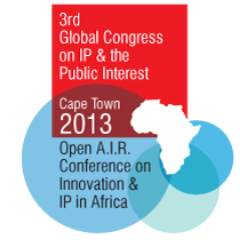 [Open Air, Link to conference website (CC-BY-SA)] This week, from 9 to 13 December 2013, delegates from national and international governmental entities, the private sector, civil society and academia are gathered for five days of interconnected events in Cape Town, South Africa. Hosted by the University of Cape Town (UCT), participants are engaging with diverse perspectives and future scenarios for intellectual property (IP), innovation and development during the combined 3rd Global Congress on IP and the Public Interest and Open A.I.R. Conference on Innovation and IP in Africa.
[Open Air, Link to conference website (CC-BY-SA)] This week, from 9 to 13 December 2013, delegates from national and international governmental entities, the private sector, civil society and academia are gathered for five days of interconnected events in Cape Town, South Africa. Hosted by the University of Cape Town (UCT), participants are engaging with diverse perspectives and future scenarios for intellectual property (IP), innovation and development during the combined 3rd Global Congress on IP and the Public Interest and Open A.I.R. Conference on Innovation and IP in Africa.
The five days of Congress & Conference events are featuring a mix of keynote speeches to plenary sessions and specialised presentations to smaller breakaway groups and workshops. Participants will break into thematic tracks in order to receive targetted presentations and conduct in-depth scrutiny of the present status of key current strands of public interest engagement with global and national IP regimes. The five thematic tracks are : (1) user rights; (2) access to medicines; (3) enforcement; (4) openness; and (5) traditional knowledge. Participants will also attend workshops proposed and convened by their fellow participants, so as to ensure that the Congress & Conference address all matters of current concern to the IP experts who make the journey to Cape Town.
The programme was developed through a collaborative planning process, via delegate submission of proposals for presentations and papers related to one of the five thematic tracks (listed above) and proposals for participant-led workshops. The approved contributions are those which address one of the five thematic tracks and also shed light on the overarching theme “Global questions, local answers”. What is the public interest in IP? Is it similar or different from place to place? What are the local priorities among the communities you work with? How are public interest IP research and advocacy activities connected? Which strategies are most effective for achieving positive change at the global or local level?




